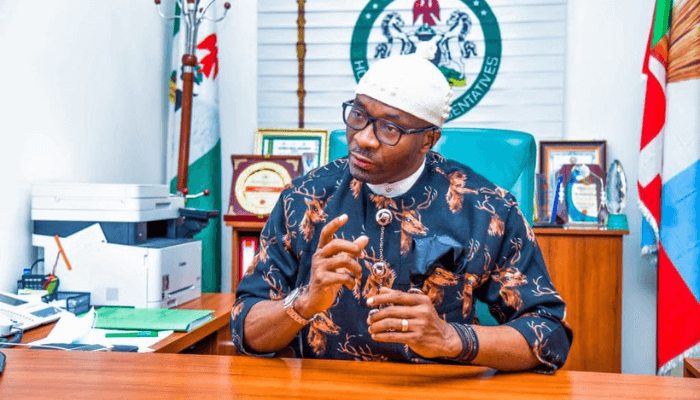837
By Tracy Moses
The Deputy Speaker of the House of Representatives and Chairman, Hon. Benjamin Okezie Kalu, has reiterated the determination of the National Assembly to produce a Constitution that truly reflects the hopes and realities of Nigerians.
Speaking on Friday at the opening session of the third retreat of the House Committee on Constitution Review in Enugu, Kalu emphasized that the ongoing review must culminate in a people-centered legal framework capable of addressing the nation’s diverse challenges.
According to him, Nigerians desire a Constitution that strengthens local governance, promotes fiscal federalism, guarantees gender inclusion, enhances electoral credibility, and fosters accountability across all tiers of government.
“In pursuit of this goal, we have assembled a distinguished team of constitutional experts, legal scholars, and policy analysts to enrich our discussions, provide comparative perspectives, and help us navigate the intricate political and legal terrain before us,” Kalu stated.
Kalu who chairs the House Committee on Constitution Review, stressed that the resolutions emerging from the Enugu retreat would shape the trajectory of Nigeria’s democratic development for generations to come.
“Will history remember us as the Assembly that empowered local governments and brought governance closer to the people? Will we be remembered as the legislature that created real opportunities for women in leadership? Or as the Assembly that rebuilt public trust in our electoral system?
“These are questions that demand not just reflection but action. As we proceed, let our deliberations be guided by unity of purpose, discipline, and a commitment to national progress,” he urged.
Kalu called on committee members to put aside political differences and focus on proposals capable of commanding broad national acceptance.
“We may represent different regions, parties, and ideologies, but on constitutional matters, our voice must be one. To succeed, we must seek bipartisan consensus and prioritize what unites us as a people,” he added.
The Deputy Speaker further advised that the Committee’s efforts be channeled toward realistic and impactful reforms rather than politically contentious issues.
“Every amendment we propose must answer one fundamental question, what is best for Nigeria? Not what serves a political party or region, but what benefits the over 200 million citizens we represent,” Kalu noted.
He reaffirmed that the Constitution remains the binding social contract among all Nigerians, stressing that the review process must embody the people’s collective vision for a stronger and more inclusive federation.
“Our work here in Enugu must produce a practical roadmap for reforms that empower local governments, ensure women’s participation, guarantee credible elections, and strengthen the principles of federalism.
“Let us depart from Enugu with renewed unity and determination to build the consensus required for the National Assembly and state legislatures to pass these amendments,” he concluded.
Representing the Enugu State Governor, Dr. Peter Ndubuisi Mbah, the Deputy Governor, Barr. Ifeanyi Ossai, called for comprehensive reforms in the judicial and policing systems to enhance justice delivery and tackle Nigeria’s deep-seated security challenges.
Ossai observed that if effectively implemented, the proposed constitutional amendments could address the socio-political, economic, and security issues confronting the nation.
He further noted that Nigeria’s political discussions often revolve around geopolitical divisions, a classification not formally recognized by the Constitution.
“In most of our political discourse, geopolitical zones have become a defining factor in national considerations. Perhaps the time has come for the legislature to determine whether this concept deserves constitutional recognition,” he suggested.
He argued that such formal recognition could strengthen the framework for inclusive governance and equitable representation, ensuring a fairer application of the federal character principle.
“Many focus on the federal character in appointments, but rarely do we discuss its reflection in national budgets and infrastructure distribution. True equity should extend beyond political positions to fair resource allocation,” Ossai explained.
Commenting on the clamour for state policing, he cautioned that effective security reform must go beyond merely creating multiple policing levels.
“Whether we call it state, federal, or local police, without proper policing standards, the result will remain the same,” he warned.
He also decried the deplorable conditions of police detention facilities across the country, describing them as inhumane and conducive to forced confessions.
“Most police cells are unfit for human habitation. Anyone kept there for just a few hours may admit to crimes they never committed. We must reform police practices, not just expand policing structures,” he stressed.
Ossai proposed a new judicial model where magistrates are placed on standby, akin to doctors on emergency duty, to handle bail applications promptly and prevent unlawful detention.
“If magistrates are available to make swift rulings, even during weekends or late hours, it will drastically reduce illegal detentions and promote fair justice administration. Such collaboration between the judiciary and parliament can make justice delivery more responsive and humane,” he added.



